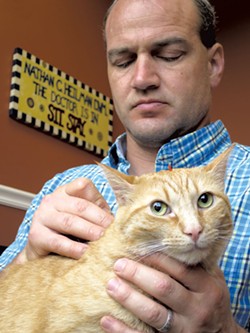Published July 29, 2015 at 10:00 a.m. | Updated July 30, 2015 at 10:41 a.m.
Name: Dr. Nate Heilman
Town: South Burlington
Job: Co-owner, Qi Veterinary Clinic
In a quiet little building on Shelburne Road, Qi Veterinary Clinic is taking a different approach to animal care. Dr. Nate Heilman opened Qi with his wife, Therese Fafard, in September 2007, after noticing a need for holistic preventive health care for pets in the Burlington area, he says. Heilman and his staff use a combination of diagnostic acupuncture, herbal medicine, pharmaceuticals and diet to address bodily "imbalances" and put animals back on the path to a healthy, happy life. At their full-service primary-care facility, they work with dogs, cats and other household animals — including chickens.
According to Heilman, Qi and the Animal Hospital of Hinesburg are the only places in the greater Burlington area that offer acupuncture and Chinese herbal medicines to their (generally) four-legged patients. While some of Heilman's patients followed him from the Vergennes Animal Hospital, where he worked for seven years, it took two years to build his new client base at Qi, he says.
"I think people were skeptical, rightfully so, for a couple years," Heilman reflects. "But this type of practice is found all over the U.S. It's just that there really hadn't been a dedicated holistic practice in Burlington, so it took a while."
The veterinarian sat down with Seven Days to talk about his holistic approach to animal health.
SD: What is the most common ailment that you encounter and the corresponding treatment?
NH: I'm going to say digestive issues, [so] we talk a lot about diet, because diet is so important for the health of the gastrointestinal tract and the individual, and most chronic gastrointestinal problems are exceptionally responsive to diet therapy. We oftentimes use herbs that improve digestive ability and decrease gastrointestinal inflammation.
SD: Some people think that pet acupuncture is a little over-the-top...
NH: Well, I can certainly understand where that sentiment comes from. And I think acupuncture in this country is sort of equated with a spa treatment, so a lot of clients say, "Well, I haven't even had acupuncture and I wanted to try it, and now my dog is getting it before me."
It's a medical intervention, and what acupuncture does is, it manipulates circulatory flow in the body. We use it really diagnostically to glean certain details about the patient's pattern and then apply diet and herbal [or pharmaceutical] medicine. So I guess what I would say is that, when we do acupuncture, we're really paying close attention to the animal, so [it's] not over-the-top. People are doing more and more for their animals all the time, so it's incumbent upon vets to do the most valuable stuff that they can.
SD: How do you get a cat to sit still while you give it acupuncture?
NH: Sometimes they don't. And yet, I'm amazed at how many cats allow some needles to go in and, as soon as I walk away, they'll sit on the exam table and just enjoy it. Cats can be pretty fiery creatures, which makes them pretty responsive to acupuncture.
SD: How many animals do you prescribe raw food for, and what are the benefits of that?
NH: About 75 percent of cats we see we prescribe raw food for, and about 50 percent of the dogs we see. That said, most animals that we see will arrive at some sort of a mixed feeding strategy [incorporating raw and processed foods]. Raw foods are composed of muscle meat, organ meat, bone, and a little bit of vegetable and fruit material. What we see in epidemic proportions is that our animals are eating too much rapidly fermentable starch. And what's happening to them is that they're becoming obese and inflamed, and eventually that inflammation manifests as really serious stuff.
SD: In terms of pricing, how do your services compare with traditional veterinary services?
NH: It's a difficult question. We're more expensive than a regular primary care veterinarian. Our office visits are [about twice as expensive,] but they're easily twice as long.
Veterinary medical costs have increased significantly in the last 15 years, and it's not uncommon for animals that get into a serious bind with intensive care requirements to incur veterinary expenses in the thousands. And, despite our best efforts, sometimes dogs wind up in intensive care situations, but [for the most part] we are able to keep animals out of acute care situations.
The bulk of the expense can go into diet, and feeding an animal a whole-food diet is an investment up front in their health. So we are more expensive from that perspective, but I think in terms of the whole cost out there for veterinary medicine, preventative care can be very cost-effective.
SD: What's the No. 1 thing people can do to keep their pets healthy and happy?
NH: Healthy levels of activity are key. Relationships are important. If animals are absorbing the stress of their caretakers, that's no good, and if they do not have sufficient opportunities to relieve stress, that really is deleterious. I think that dogs need to be dogs and cats need to be cats, so make sure that animals have sufficient physical play and outlets; make sure that they're not doted on too much, that you just relate to them in a very natural way. And then there's nutrition. Feed them as nature intended. I think that those three things are the most important ways to keep them healthy.
Work is a monthly interview feature showcasing a Vermonter with an interesting occupation. Suggest a job you would like to know more about: [email protected].
The original print version of this article was headlined "Balancing Acts"
More By This Author
About the Artist

Matthew Thorsen
Bio:
Matthew Thorsen was a photographer for Seven Days 1995-2018. Read all about his life and work here.
Matthew Thorsen was a photographer for Seven Days 1995-2018. Read all about his life and work here.
Comments
Showing 1-1 of 1
Comments are closed.
From 2014-2020, Seven Days allowed readers to comment on all stories posted on our website. While we've appreciated the suggestions and insights, right now Seven Days is prioritizing our core mission — producing high-quality, responsible local journalism — over moderating online debates between readers.
To criticize, correct or praise our reporting, please send us a letter to the editor or send us a tip. We’ll check it out and report the results.
Online comments may return when we have better tech tools for managing them. Thanks for reading.
















































